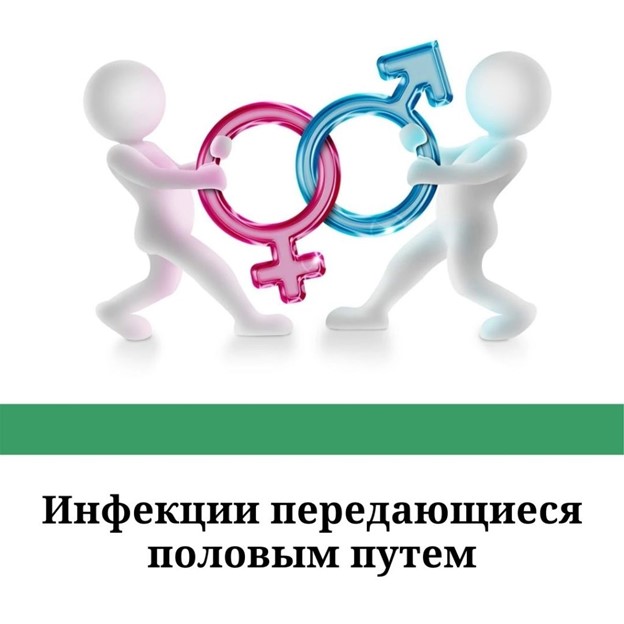(STIs)
19.02.2024 | Heading: Information

Infections, sexually transmitted (STIs) – group of diseases, for whom sexual intercourse is the main or predominant one. It is known, that sexually (with vaginal, anal and oral sex) can be transmitted more 30 various bacteria, viruses and parasites. Eight pathogens cause the highest incidence of STIs. Of these, four infections are syphilis, gonorrhea, chlamydia and trichomoniasis are currently curable. The remaining four infections are hepatitis B, herpes simplex virus (HSV), HIV and human papillomavirus (HPV) are viral in nature and cannot be cured.
STIs are more often contracted through sexual intercourse (for all types of sexual activity), because. the most suitable environment for the propagation of pathogens of these diseases is the mucous membrane of the genital organs, mouth, anus, eye etc. d. Many STIs can pass from mother to child (during pregnancy, when giving birth or caring for small children). HIV and syphilis can be contracted not only through sexual contact, but also through blood. These diseases occur in waves, the period of manifestations is replaced by a complete absence of complaints (latent period).
The most common manifestations of STIs include:
- redness, sores, cracks, blisters or warts at sites of microbial penetration (often genitals, anus, oral mucosa, perineal skin);
- itching or burning in the external genital area;
- unusual (copious mucous, purulent or bloody) genital discharge, often accompanied by an unpleasant odor;
- frequent, painful urination;
- pain during sexual intercourse;
- pain in the lower abdomen, swollen lymph nodes in the groin area.
It should be noted, that clinical manifestations of STIs are not always present! Therefore, if you assume, that they could have become infected, or your sexual partner has been diagnosed with an STI, and you have no symptoms of the disease, you should immediately consult a doctor-specialist, undergo examination and, if necessary, undergo a course of treatment.
The disease can become chronic, ie. manifest less and are more difficult to treat. Inflammation can spread through the urinary tract to the kidneys, the infection can spread to other organs through the blood and lymph. AND, Consequently, infertility develops (male and female), prostatitis, impotence.
Problems, disease-related, sexually transmitted, much more serious, than pain and discomfort, caused by infection. The main danger of STIs lies in the consequences of the disease, complications for men's health, so for women. In women, infections can be transmitted through the placenta or during childbirth to the fetus., causing serious illness and complications in newborns.
Diseases, sexually transmitted, dangerous because, which cause inflammatory diseases and damage to vital organs and systems of the body, disrupt their functions, including reproductive, in men and women.
So, treponema pallidum, causative agent of syphilis, capable of penetrating almost any organ - the heart, liver, kidneys, lungs, nervous system. That's where she lives, feeds and reproduces, disrupting the normal functioning of the organ. In serious cases, syphilis can cause disability and death.
Chlamydia infection is no less dangerous. It affects not only the genitals, but also leads to conjunctivitis, pneumonia, cholecystitis and inflammation of the liver lining. Chlamydia provokes the development of inflammatory diseases of the genital area, which, in the absence of timely and adequate treatment, lead to infertility.
Also known, that STDs increase the risk of HIV transmission, since they affect the mucous membrane of the genitourinary organs and make it more vulnerable.
In this way, complications of STDs are numerous inflammatory diseases - cystitis, endometritis, prostatitis, epididymitis, adnexitis, orchitis, etc., various neoplasms in the genital organs, caused by inflammation - adhesions, strictures. As well as infertility in women and men.
You can get two or more infections at the same time. It is impossible to recover from an STI without special treatment., ie. there can be no self-healing. The sooner you see a doctor, the more chances of recovery. By the way, immunity does not develop after recovery, so you can get infected again.
The more partners you have sexual contact with, the higher the risk of disease. If you are unsure about your sexual partner or have discovered a rash, redness, sores (in the genital area or other parts of the body), genital discharge, refuse sexual intercourse. Use a condom every time you have sex, which reduces the risk of infection, but it doesn't remove it completely.
After consulting a doctor and conducting the necessary diagnostic tests, diagnoses, complete the full course of treatment. If during therapy you feel better and the symptoms of the disease have disappeared, do not stop treatment, since if canceled prematurely, symptoms may recur and the disease will become chronic, which is difficult to treat. Do not have sexual intercourse during the entire course of treatment, because you can pass the infection on to your partner and then get re-infected from him.
Infection Awareness, sexually transmitted, will help avoid many problems! take care of yourself, your loved ones and be healthy!






























